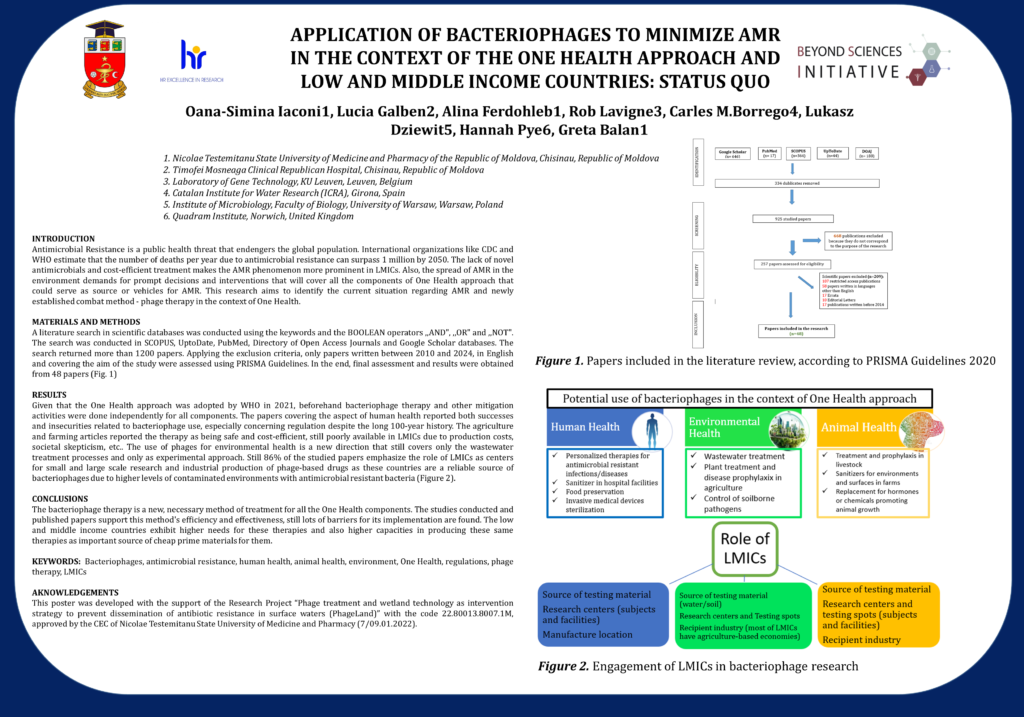Oana-Simina Iaconi
Moldova
Application of bacteriophages to minimize AMR in the context of the One Health approach and low and middle income countries: status quo
Iaconi Oana-Simina1, Lucia Galben2, Alina Ferdohleb1, Rob Lavigne3, Carles M.Borrego4, Lukasz Dziewit5, Hannah Pye6, Greta Balan1
1. Nicolae Testemitanu State University of Medicine and Pharmacy of the Republic of Moldova, Chisinau, Republic of Moldova
2. Timofei Mosneaga Clinical Republican Hospital, Chisinau, Republic of Moldova
3. Laboratory of Gene Technology, KU Leuven, Leuven, Belgium
4. Catalan Institute for Water Research (ICRA), Girona, Spain
5. Institute of Microbiology, Faculty of Biology, University of Warsaw, Warsaw, Poland
6. Quadram Institute, Norwich, United Kingdom
Abstract
Background
Antimicrobial Resistance is a public health threat that endengers the global population. International organizations like CDC and WHO estimate that the number of deaths per year due to antimicrobial resistance can surpass 1 million by 2050. The lack of novel antimicrobials and cost-efficient treatment makes the AMR phenomenon more prominent in LMICs. Also, the spread of AMR in the environment demands for prompt decisions and interventions that will cover all the components of One Health approach that could serve as source or vehicles for AMR. This reasearch aims to identify the current situation regarding AMR and newly established combat method – phage therapy in the context of One Health.
Methods
A literature search in scientific databases was conducted using the keywords and the BOOLEAN operators ,,AND”, ,,OR” and ,,NOT”. The search was conducted in SCOPUS, UptoDate, PubMed, Directory of Open Acces Journals and Google Scholar databases. The search returned more than 1200 papers. Applying the exlusion criteria, only papers written between 2010 and 2024, in English and covering the aim of the study were assessed using PRISMA Guidelines. In the end, final assessment and results were obtained from 48 papers.
Results
Given that the One Health approach was adopted by WHO in 2021, beforehand bacteriophage therapy and other mitigation activities were done indipendently for all components. The papers covering the aspect of human health reported both successes and insecurities related to bacteriophage use, especially concerning regulation despite the long 100-year history. The agriculture and farming articles reported the therapy as being safe and cost-efficient, still poorly available in LMICs due to production costs, societal skepticism, etc.. The use of phages for environmental health is a new direction that still covers only the wastewater treatment processes and only as experimental approach. Still 86% of the studied papers emphasize the role of LMICs as centers for small and large scale research and industrial production of phage-based drugs as these countries are a reliable source of bacteriophages due to higher levels of contaminated environments with antimicrobial resistant bacteria.
Conclusions
The bacteriophage therapy is a new, necessary method of treatment for all the One Health components. The studies conducted and published papers support this method’s effieviency and effectivness, still lots of barriers for its implementation are found. The low andd middle income countries exhibit higher needs for these therapies and also higher capacities in producing these same therapies as important source of cheap prime materials for them.


Leave A Comment